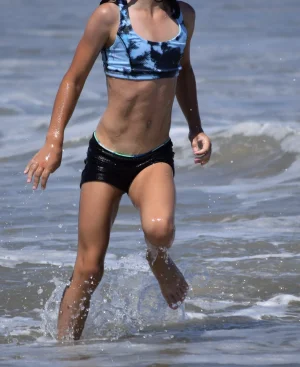I have never spoken to a parent about their child's weight, it was just a thought. It also probably applies less to team kids since they don't rely on spotting as heavily.
I don't agree with that either but I think your coaching strategy depends on your size and the size of the gymnast, and there are a lot of strategies you can take and tools you can use. Most of us are not coaching Olympians so primarily gymnastics is an outlet for fun and fitness. The skills and lesson plans we develop should have that in mind. If we can't spot a child on a back handspring, we can use other tools and progressions, and incorporate other things into the lesson plan.
Spotting should be primarily to enforce correct technique, but in order to achieve a skill non spotted progressions that start at the gymnast's level until they gain enough strength to support their body on their own are the most important thing. Size will definitely influence some kids' potential in gymnastics. Trampoline programs may be a good outlet for some of these athletes.
As it relates to this topic, the coaches as role models for these children in fitness, and again primarily for fun and fitness, should be modeling the desired habits and creating plans that expose the children to different styles of exercise and encourage them to increase their strength. This means not using conditioning as a punishment, and developing motivating ways of helping the children. Because I am not developing Olympians, my athletes do run and work up to about a mile while I express excitement at how well they doing and how amazing that is. Over time the kids will start exclaiming how easy it now is, etc look how much we've improved. They are proud of their results and understand what they have achieved. You don't have to run a mile in gymnastics. I know that. And it isn't an everyday thing or our sole focus. But it's no longer done in the schools and when the kids come to me they have low cardiovascular fitness. So we work up to it. What little negative effect it has on non-elite gymnastics skill is probably worth it, because again most of what my kids will get out of gymnastics is the lasting benefits of the strength and cardiovascular training, habits that may affect them for life.
So I think the coaches need to look at their role and responsibility in how they want to influence the athletes. They shouldn't want to change an athlete's body shape to make it easier for them, or because it makes them look bad. They should be motivated by increasing the baseline level of fitness the child already has and modeling healthy habits.
And coaches need to understand that there are significant cultural, socioeconomic, and personal reasons for many families' eating habits. In addition, most coaches are not nutrionists or pediatricians. You really shouldn't dispense medical or nutrition advice to families, particularly not unsolicited, except to refer them to professionals. If coaches of a high performance athlete do notice a problem, they should really bring in a nutritionist rather than just make things up that they "think." Who knows if the child in question really needs to restrict calories, I'm pretty sure the coach has not seen exactly what she eats in one day, and yet we have a coach who dispensed that advice. That is very troubling to me. Either the coach is questioning the child about what she eats or the coach is just making things up because they think the child should be slimmer. Either way, huge problem. They really need to bring in a nutritionist and check themselves.
